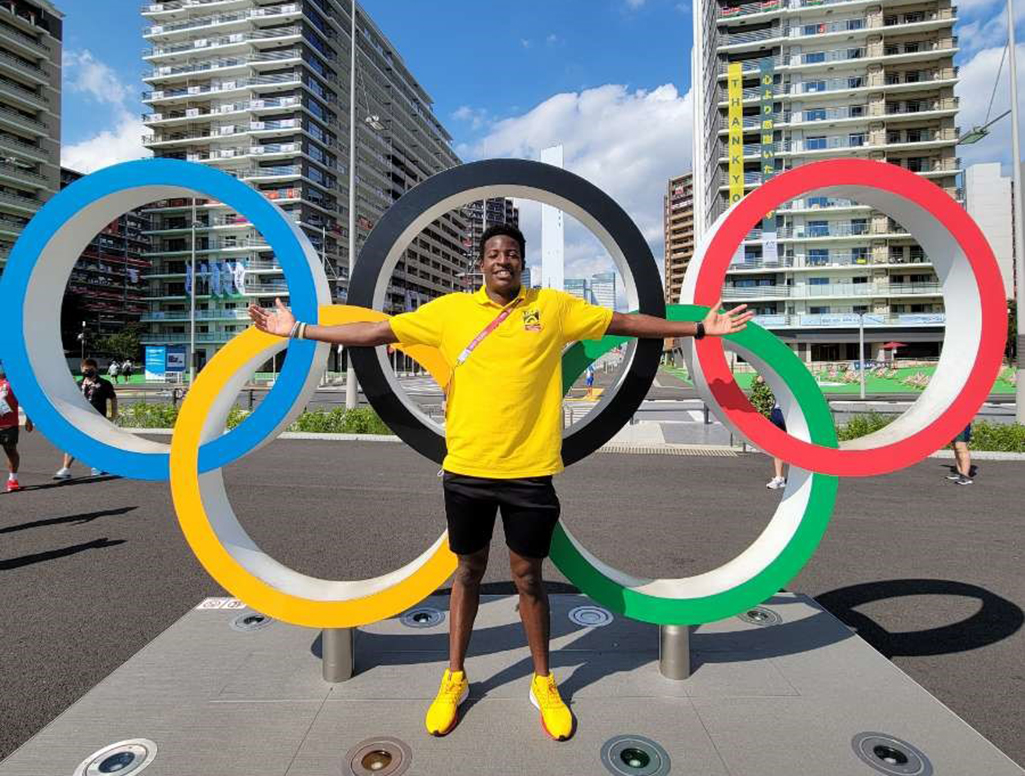Clark swimmer will compete for Uganda in Tokyo Olympics

Atuhaire “Atu” Ambala ’25 will hit the pool this year as one of Clark swimming and diving’s new recruits. But before you watch him compete for the Cougars, you can catch him racing on a much larger stage — the 2020 Olympic Games in Tokyo.
Ambala, 20, is representing Uganda at the Olympics, where he will swim in the men’s 100-meter freestyle (Heat 2) on Tuesday. The race will be broadcast on USA Network at 6 a.m. EST.
“It’s an amazing feeling and, above all, it’s an honor that God has given me the opportunity to represent my country at the Tokyo Olympic Games,” Ambala says. “Getting selected for the Olympics is also a testament to all the hard work, time, and effort that my coaches have invested in me. I’m extremely grateful to them. I’m looking forward to improving my time and putting all the hard training I’ve done throughout the years to good use.”
Paul Phillips, coach of Clark’s swimming and diving team, says his swimmers are thrilled to welcome Ambala to campus this fall, adding that Ambala and several of his teammates will be competing at the highest levels of the NEWMAC conference.
“When you add someone at his level and with his experience, it raises the bar for what our team can accomplish,” Phillips says. “They’re looking forward to training with him. He’ll be in our sprint group, so they do a lot of max-effort type stuff. They’re racing every day in practice.”
Ambala began swimming when he was just 18 months old. At the age of 6, he began training competitively, tapping into what his parents, Chris Ambala and Monday Businge, describe as an “innate athletic ability.” In subsequent years, he set a number of national records, many of which stand to this day.
Along the way, Ambala overcame numerous obstacles, including a multi-hour commute to and from practice and a lack of resources. The swimming facilities in Uganda are not comparable to those of developed countries, according to Ambala’s parents, who say the largest pool in the country is just 25 meters long. Most facilities also lack amenities like lane ropes, water filtration systems, starting blocks, and backstroke flags.
“Swimming in Africa is considered an elite sport, so it receives little government support, particularly at the intermediate stage,” Chris and Monday wrote in an email. “We had to save up in order to fund his trips to regional and continental championships in Kenya, Uganda, Angola, Mauritius, South Africa, Egypt, and Algeria.”
Despite the challenges, Ambala excelled. In high school, he was awarded a FINA scholarship to train at a world-renowned facility in Phuket, Thailand, which gave him the opportunity to compete on a global stage. He went on to compete in several events at the 2018 African Swimming Championships in Algiers, Algeria, and swam the men’s 100-meter butterfly at the 2019 African Games in Rabat, Morocco.
Two years ago, he represented Uganda at the 2019 World Aquatics Championships in Gwangju, South Korea.
When Ambala qualified for the Olympics, his family was elated. His mother plans to watch him compete in Tuesday’s race from Uganda, where she is on vacation with his two younger siblings, Ahura and Agonza. His father says he will watch from Nairobi. “The Olympics are the pinnacle of sports competition. It was a dream come true in many ways,” Chris and Monday say. “We will be praying for him, cheering him on, and screaming ourselves hoarse as we watch the race on TV.”
The past year of COVID-related challenges has also made Ambala’s appearance in the Olympics even more of a feat. When the pandemic first hit, Ambala was out of the pool for nearly five months. He traveled to Kenya to spend time with family and began dry-land training — but says nothing could replace being in the water. He was able to resume practices intermittently last August, but the ever-changing COVID-19 situation caused the pool to close constantly. In mid-April, he returned to Uganda, where he was able to train more than once a day under strict conditions. Two months later, he flew to Japan for a pre-Games camp.
“I was happy that I was able to train in a long-course pool for the first time in over a year,” he recalls.
Now in Tokyo, Ambala’s Olympic aspirations have become a reality. He’s enjoyed interacting with athletes from across the world in the Olympic Village and looks forward to competing on Tuesday.
“Swimming has given me so much,” he says. “I have traveled to so many countries because of this sport. I have made many friends and have countless memories, and I will forever be grateful.”
After the Olympics, Ambala will pack his bags and head to Clark, where he plans to study economics or computer science. He says he was drawn to Clark by the University’s close-knit community and intimate campus, as well as the opportunity to study and swim at the college level.
“This is something I am excited to experience,” he says. “I’m looking forward to learning new things from people from all over the world.”


